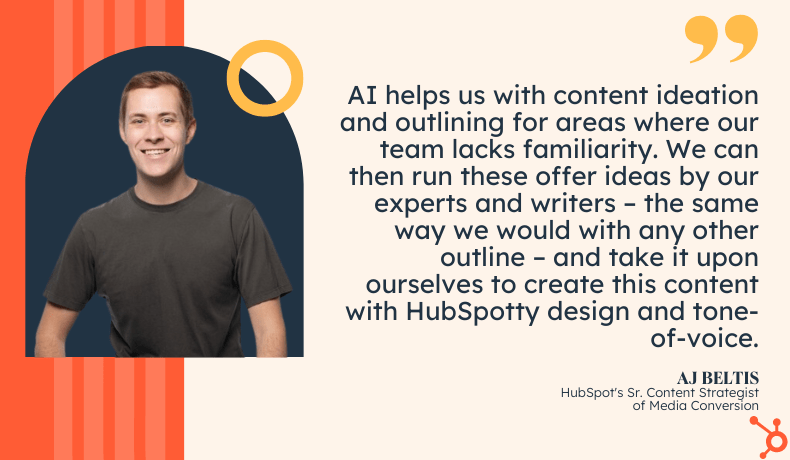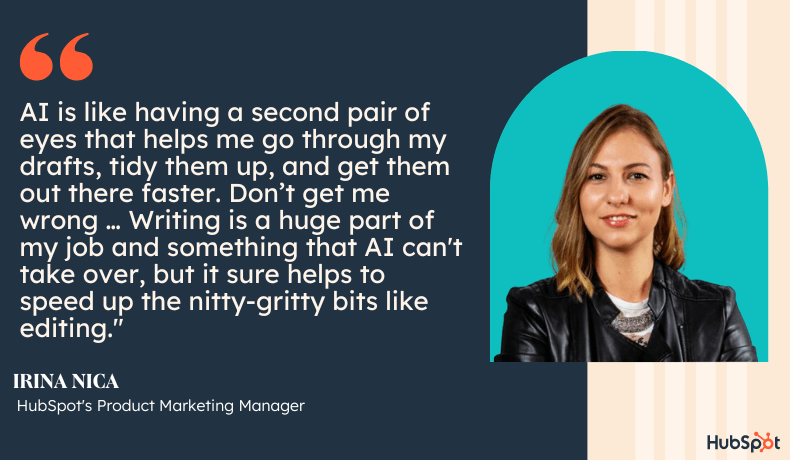by Caroline Forsey for HubSpot
AI has undoubtedly upended the way professionals across the organization work.

And content creation is no exception.
Advances in artificial intelligence (AI) are offering new ways for marketers to create more effective and engaging content. From automating content creation to improving personalized recommendations, AI is reshaping the content marketing landscape.
But if you’re unsure how to leverage AI to create better content, you’re not alone. At HubSpot, we’ve been exploring the fine line between using AI to enhance our content without relying too heavily on it.
Here, let’s explore some of the ways HubSpotters across the marketing organization are leveraging AI to enhance their content and drive better results.
How HubSpotters Are Enhancing Their Content with AI
1. HubSpotters Are Using AI to Figure Out Which Type(s) of Content to Make
One of the most powerful use cases for AI is figuring out what content you want to create in the first place.
For instance, AJ Beltis, HubSpot’s Senior Content Strategist of Media Conversion, told me, “Part of my team’s responsibilities is to create content offers on high-traffic blog posts that convert visitors into leads at as high of a rate as possible, which we then promote on that blog through CTAs. Understandably, some blog posts are more challenging to create content with a reliable conversion path.”
He continues, “For instance, when our blog team writes a post about marketing planning strategy, we know a downloadable marketing plan template will work as a CTA. However, some of our more technical topics on our Website Blog aren’t as straightforward when it comes to our traditional conversion strategy.”
Which is where AI comes in.
He says, “Here, we turn to AI and ask prompts like ‘What would somebody reading a blog post about (Topic X) want to learn about next?’ or ‘What is a template, guide, or checklist that somebody would find useful after reading a blog post about (Topic Y)?'”
Similarly, you might leverage AI chatbot tools like ChatSpot for your own content strategy. Beyond brainstorming blog topics that relate to your core product or service, you can use AI to determine which types of downloadable offers make the most sense for each individual piece of content.
As Beltis puts it, “AI helps us with content ideation and outlining for areas where our team lacks familiarity. We can then run these offer ideas by our experts and writers – the same way we would with any other outline – and take it upon ourselves to create this content with HubSpotty design and tone-of-voice.”

2. HubSpotters Are Using AI to Discover The Right Audiences — And How to Speak to Them
Justin Graci, HubSpot’s Marketing Fellow, Partner GTM & Product Readiness, uses AI in his role to determine who his audience is and what matters most to them.
He told me, “I leverage generative AI to change the tone of my writing by informing ChatGPT who my audience is and what they care most about. Very quickly, I can adapt my copy to be more tailored to the different audiences I’m writing for without having to research whether one audience prefers shorter versus longer form, deep context versus high level, or informal versus professional.”
One of the most difficult aspects of content creation is shifting your tone depending on your audience and the platform for which you’re creating content. For instance, your tone will change depending on whether you’re creating content for an Instagram post versus a weekly newsletter.
Rather than spending hours finessing your content to fit the platform and audience, you can use generative AI to speed up the process and spend more time on what matters most: The content itself.
Additionally, you might consider leveraging AI to help hit the right tone with your buyer persona.
As Graci puts it, “I’m also using AI for sales enablement … Being able to generate templates and phrases that are effective and proven to engage buyers has been immensely helpful when creating sales email templates and collateral.”
3. HubSpotters Are Using AI As Their Own Creative Co-Pilots
HubSpot’s Associate SEO Strategist Josh Blyskal is a big fan of AI.
As he puts it, “When I use AI in my role, I’m amplifying what I already know I can do. When I get stuck or have a mental block, that’s when I open up my AI tools. AI is like my creative co-pilot — it’s not going to everything perfectly, and I don’t expect it to. AI has been most beneficial in enabling me to quickly outline, plan, and get the ball rolling.”
His colleague, SEO Strategist Bianca Anderson, agrees. She told me, “For me, AI has served as the ultimate virtual assistant. I’ve been using AI daily to improve my internal communications with stakeholders and have found that it’s particularly effective in editing for tone and clarity. It even helped me write out this quote!”
She adds, “Additionally, AI has become a valuable resource for me in outlining memos for larger projects. It provides a solid foundation for me to build upon and refine, which greatly streamlines my workflow.”
Note that neither Blyskal nor Anderson use AI to replace their role in the content creation process — instead, they use it to amplify their content in much the same way you’d turn to a colleague if you were stuck on a paragraph or concept.
HubSpot’s Senior Marketing Technical Manager – AI, David Groechel, agrees that AI is a catch-all when it comes to content creation. He told me across the Marketing department he’s seen all teams leverage AI to create copy: “We throw copy into ChatSpot and have it give us iterations or come up with ideas we can riff on.”
(Bonus: If you’re a HubSpot customer, you can access your own creative co-pilot – Content Assistant – which is natively integrated in HubSpot’s platform and can effectively generate copy for you.)
4. HubSpotters Are Using AI to Off-load Time-consuming Tasks
One of the most powerful advantages of using AI is how much time it frees up for you to focus on tasks that, quite simply, need a human touch.
Marketers, sales professionals, and service professionals can now offload route, mundane, and repetitive tasks to AI — and save the work that requires more creativity, innovation, and empathy for themselves.
As HubSpot’s Senior Marketing Manager Pernilla Jungåker puts it, “Since I’m the only marketer for seven countries (Nordics and Benelux), I use AI to help me with easier yet time-consuming tasks to take some workload off my plate and save time. For instance, it could be summarizing a webinar landing page I’ve created and using that text in an email. Or creating versions of ads text so the ads team can test the different texts against each other.”
Justin Graci agrees, adding, “My writing process often requires me to get a lot of thoughts on a page before tightening it up in a way that makes it clearer to a reader (making every word fight to be on the page is key). With tools like ChatSpot I’m able to paste in my long paragraphs and ask it to shorten the copy without losing its depth … and Voila!”
He adds, “I also use AI on a daily basis to get over writer’s block. For example, I’m in the process of writing a new content offer and for each section I’ve come against a brain block on how to articulate certain points … So off to ChatSpot I go for inspiration instead of mulling over it for hours.”
As a writer myself, I’m well-aware of the time-suck that writer’s block can become. With AI, the days of staring out the window and waiting for inspiration to strike are gone. That, in itself, can quickly become an easy way to save hours of time.
The same goes for social media content, as well. As Nicole Phillip, The Hustle’s Senior Social Media Manager, told me, “Operating as a one person show has its challenges, but generative AI has made it a bit easier. I’ve started using ChatSpot for help with content ideation, text summaries and script-writing.”
She adds, “Of course, generative AI is still imperfect, so there’s fact-checking and rewriting that needs to be done, but it takes what would usually be hours of brainstorming and reduces the time needed to develop content like TikToks, especially.”
5. HubSpotters Are Leveraging AI to Edit Their Work & Research Faster
HubSpot’s Product Marketing Manager Irina Nica’s role requires her to get the latest news out about HubSpot’s product launches — which includes writing blog posts, product updates, and sales materials quickly.
Leveraging AI in the editing process has been monumental for Nica.
She told me, “One of my favorite go-tos is the Content Assistant’s blog writing feature. It’s like having a second pair of eyes that helps me go through my drafts, tidy them up, and get them out there faster. Don’t get me wrong … Writing is a huge part of my job and something that AI can’t take over, but it sure helps to speed up the nitty-gritty bits like editing. Plus, it’s a lifesaver when it comes to brainstorming catchy titles based on my own drafts.”

Beyond the editing process, AI can also supercharge your research process. Rather than spending hours on Google, you can now ask a chatbot to provide you with a fast, compact paragraph with all the information you need to get started.
Nica says, “I also like to use ChatSpot for getting quick recommendations for products, books, or any type of resource really. Say I’m looking for the best product marketing book for SaaS companies; normally, I’d be knee-deep in Google searches, reading articles and checking out recommendations on Goodreads. But with the right prompt, ChatSpot can get me there 10X faster. I still give its final recommendation a quick Google check, but it’s a super handy shortcut.”
While these are some of the most effective ways HubSpotters have been using AI in their roles, I’m sure this list with evolve – and expand — over time. We’re in the early days of AI, so it’s critical you take the time to experiment within your own role and determine how AI can work best for you.
And you might try becoming comfortable with AI outside of your professional life, too. As Nica told me, “AI is not just for work. It’s great for personal stuff, too. For example, it can help me find the best stops on a road trip or whip up a recipe for toddler-friendly, no-sugar, oat flour, banana muffins.”
